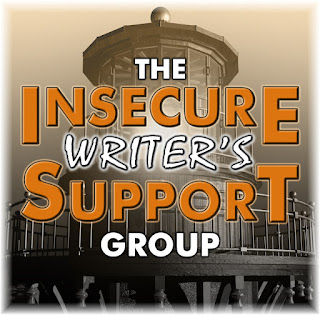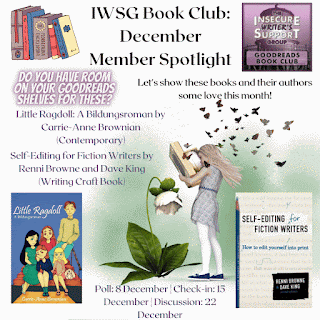Monday, December 19, 2022
Happy Holidays From IWSG
Monday, December 12, 2022
5 Ways to Recharge After Suffering Writer’s Burnout
by Colleen M. Story
We’re coming to the end of the year—which means you may be feeling writer’s burnout.
Even a regular year of writing can be taxing. Add in a book launch (or two?), NaNoWriMo, and a few challenges on your WIP, and you may be thinking that you’d be just fine if you never wrote again!
But don’t worry. That’s the weariness talking. And weariness—even if it’s creeping into burnout—can be fixed with the right kind of rest.
Try the following suggestions and see if, by the time the new year comes around, you don't feel ready to pick up the pen (or keyboard) again.
1. Get Some Extra Sleep
Most of the time, you have to tend to the body first. Trying to restore your mind, emotions, and creativity while you’re still dragging around physically doesn’t work.
Writers are consistently up against deadlines and expectations. It’s common to end up at the end of the year feeling physically exhausted.
If you haven’t gotten a good night’s sleep in a while, you’re getting sick more often, or you’re experiencing more aches and pains than usual, you need this type of rest.
Solution: Take some time to tend to your sleep routine. Make sure you have a comfortable, quality mattress (they should be replaced every 5-8 years usually), that your room is cool and quiet, and that you keep all technology (including televisions) out of the bedroom.
Then incorporate a daily stretching routine or yoga practice to ease muscle tension. Finally, give yourself at least a weekend to rest as much as you need to. Use naps as much as you like!
2. Give Your Brain a Break
Writing takes a lot of brain power. We have to keep our settings, characters, timelines, and plotlines straight, and then we have to make sure we reach all our editing, publishing, and marketing deadlines.
After a year of writing, marketing, and book launching, your brain needs a break. Sleep will help, but it’s not enough.
If you suffering from brain fog and you’re taking longer than usual to get your projects done, you need this type of rest.
Solution: Try meditating, crafting, coloring, and long walks. Then schedule at least half a day once or twice a week to banish browsing and let your brain veg out. Rekindle your love of daydreaming.
3. Cater to Your Feelings
The writing life is a roller coaster. We all feel the ups and downs. Writing acceptance! Writing rejection. Great review! Poor review. A day in the writing flow. A day of writer’s block.
If you’ve spent the year “sucking it up” through a variety of disappointments, you need this type of rest.
Solution: Share your feelings in a journal. Establish and maintain boundaries with other people. Take a step back from demanding relationships for a while. Do what makes you feel happy. Be self-indulgent! Grant yourself a day to do anything you want without guilt.
Then go back and re-read all the positive comments and reviews you’ve received on your writing.
4. Court Your Muse
After a year of writing and marketing, your creative muse may have gone into hiding. We expect it to always be there for us, but sometimes we ask too much of it and it naturally withdraws.
If you’re suffering from writer’s block or can’t come up with a new idea to save you, you need this kind of rest.
Solution: Get involved in activities that inspire you. Spend some time in nature. Allow yourself to experience beauty in any form. Expose yourself to some fine art or good music. Spend a day trying on outfits you love. Spruce up your writing nook so it feels more conducive to creativity.
If you like, try writing something completely different than you usually do: a children’s story, poem, or personal essay.
5. Shut Out the World
Particularly if you’re an introverted writer, you could be suffering from sensory overload. All the interacting on social media, book signings, conference going, and other demands of the writing life can have you craving a dark room and lots of alone time.
If you’re more irritable than usual or feel like your nerves are on end, you need this type of rest.
Solution: Indulge your inner mole. Shut yourself away from the world for a day or more if you can. Take a weekend to curl up with a good book or rent a cabin by the lake where all you’ll hear in the morning are the birds. Silence can be incredibly restorative.
NOTE: Through December 2022, all of Colleen's writing ebooks are on sale for only $2.99 or less! Get your copies here. You can also find free chapters of her book and a free giveaway here.
Colleen M. Story is a novelist, freelance writer, writing coach, and speaker with over 20 years in the creative writing industry. Her latest release, The Beached Ones, is from CamCat Books. Her novel, Loreena’s Gift, was a Foreword Reviews’ INDIES Book of the Year Awards winner, among others.
Colleen has written three books to help writers succeed. Your Writing Matters is the most recent, and was a bronze medal winner in the Reader Views Literary Awards (2022). Other award-winning titles include Writer Get Noticed! and Overwhelmed Writer Rescue. Enjoy free chapters of these books here.
Find more at her author website (colleenmstory.com) or connect with her on Twitter (@colleen_m_story) and LinkedIn.
Wednesday, December 7, 2022
Its #IWSG Day, December 7th
#IWSG Insecure Writer’s Support Group
December 7th
Sign Up And Become a Member
Our Twitter handle is @TheIWSG and hashtag is #IWSG.
Every month, we announce a question that members can answer in their IWSG post. These questions may prompt you to share advice, insight, a personal experience, or story. Include your answer to the question in your IWSG post or let it inspire your post if you are struggling with something to say.
The next IWSG Twitter Pitch
will be January 25, 2023!
Check out details on our #IWSGPit page.
There have been so many success stories over the years –
your manuscript might be next. Start polishing those stories and pitches now.

The awesome co-hosts for the December 7 posting of the IWSG are
Joylene Nowell Butler, Chemist Ken, Natalie Aguirre, Nancy Gideon, and Cathrina Constantine!
This month spotlights are:
IWSG Member Book: Little Ragdoll: A Bildungsroman-https://www.goodreads.com/book/show/41556326-little-ragdoll
Craft Book: Self-Editing for Fiction Writers- https://www.goodreads.com/book/show/180467.Self_Editing_for_Fiction_Writers
Monday, November 28, 2022
Critique Group Know How
One of the first pieces of advice I received when I started to write for publication was to find a critique group. Back then, I was pretty much doing whatever anyone told me since I had no idea what this writing business was about, so I reached out and soon connected with a small band of people who said they were writers.
It turned out that two of them were and two wanted to be.
One actually published the book she’d brought to the group and that we'd all read and critiqued. Another finished writing an excellent saga, but never published it. Both of these people impressed me with their talent and know-how, and I learned a lot from them. Our format was to submit writing samples via email about a week before we met, and then give our comments in person. We’d spend about three hours every other week, so slowly our time together became social as well as professional. The group lasted about five years before it disbanded. By that time, I was convinced that I needed other eyes and minds attending to what I was writing, so I found a second group.
This time the members met online, submitting their work via email, critiquing it, and emailing it back. Unfortunately, once I was involved, I discovered there was quite an unevenness in the level of writing, and much of the feedback wasn’t helpful. Soon, three of us peeled away and formed a more cohesive group. These writers turned out to be keen-eyed editors as well as excellent and dedicated writers. I’m still exchanging work with two who have gone on to publish several successful books.
Sometime during these critique group experiences, I realized that while I was improving my writing craft, I was also acquiring two more important skills—critiquing and networking in this new field where I knew nobody. Also, I’d become much more discerning about the kind of group I wanted to affiliate with, so I formed a plan.
When I played tennis, I always tried to find better players to compete against, reasoning that I could improve my game that way. So I applied that principle to this new endeavor. Before I joined another critique group, here's what I did.
I asked to read samples of their work and submitted samples of my own.
I asked to see an actual critique they’d done and reciprocated with one of my critiques.
I told them I needed to know about their format--online or in-person as well as their schedule for submitting.
The reason I asked about the last item is that I’m a slow thinker and like to consider a piece before I make suggestions or offer comments. I prefer reading large chunks of a manuscript rather than chapters or excerpts. I told any group I wanted to join that I recognized carving out a large amount of time might be difficult for people. However, I made it clear from the start that I was open to exchanging full manuscripts and longer segments of a WIP. This turned out to be good because sometimes we actually exchanged full manuscripts.
So far I’ve been a part of four different writing groups, and after this amount of time sharing work, I’ve come to recognize a pattern that seems to be common to all of them.
There is a tendency to want to maintain a cohesive and friendly atmosphere, especially after a group has a long history. This is great, but it can also lead to less helpful comments. Saying that something’s "just wonderful" makes a writer’s heart flutter with joy, but what if it isn’t just wonderful? What if they could make it better than it is? And what does just wonderful mean anyway? While it’s obviously kinder comment, it’s not any more helpful than, This isn't good."
When I go through one of the sample critiques to make my decision to join a group or not, I look for three things:
their overview comments
the kinds of edits (punctuation, typos, global impressions), and
specific suggestions for improvement.
I like to find an opening positive statement—there’s always something good in any writing, and that should be acknowledged. I like to find clear corrections about everything from those mechanical details to emotional responses, but most importantly, I like to find specific suggestions that I can consider to improve my work.
Some groups like to hear the story read to them by the writer. I love being told a story, but I believe hearing one changes the perception. I’ve experienced that while listening to audiobooks. I’ve continued with an audible story that I know I would have stopped had I been reading it. It seems there’s kind of a “grade elevation” effect when you hear writers read their stories.
I found some studies contrasting the two modalities for processing writing (silent reading and hearing the story). These studies focus on retention of material, and the few abstracts I’ve read, indicate that there is either no difference in retention or retention is enhanced. I’d like to find some studies that contrast the perception of quality and enjoyment. Know of any studies like these?
In general, I believe critique groups have great value. They give writers different points of view on their solitary endeavors and open possibilities for growth and improvement. However, it has to be the “right” fit for me, and I think that’s important for any writer to determine before joining and sharing their work.
I hope you’ll weigh in if you’ve had critique group experience. And by all means, let me know if you agree or disagree with my take on the topic.
Monday, November 21, 2022
Creating a Reading Log in Your Journal
By Olivia Gaines, USA Today Bestselling Author
To be a great writer, one must first be a great reader. Each year, I meander over to my Goodreads page and enter the reading challenge. I spend a great deal of time in my head, creating these amazing imaginary worlds, which often hinder my time to read. Yet, it never fails, I enter the annual reading challenge and set my goals low. I have entered 36 books. This equates to 3 books per month which is totally doable.
I discovered, much to my chagrin, that which was not doable was a writer, stuck in one mode. A mode centered on one or two genres, neither of them in romance. Then it hit me, hard, to my solar plexus, this idea so ingenious, I wanted to make out with myself. I’m going to buy a journal to layout out my entire year as an author. In this journal of wonderful beauty, I shall create a reading log for the entire year.
The reading log, to end all reading logs will ensure, that as I look back over my year, my quarter, or my month, I have crossed the spectrums in Genreville in my reading journey.
So first, let’s make sure I have a handle on the genres. Here is my list of fiction book genres:
Fantasy Adventure Romance
Contemporary Dystopian Mystery
Horror Thriller Paranormal
Historical fiction Science Fiction Children’s
This is good; now how about non-fiction genres? List of nonfiction book genres:
Memoir Cookbook Art
Self-help Development Motivational
Health History Travel
Guide / How-to Families & Relationships
Humor
Okay, this is great, a lot of variety. Next, I needed to section off an area in the back of my journal. For our purposes, you can use a simple A5 Dot grid journal. I selected six pages in total.
My cover page for my reading journal needed to be special. I already possessed this rubber book stamp from Deep Red. A rubber stamp with lines, along with a set of alphabet stamps I found at my local Tuesday Morning for five dollars. Armed with these tools, I sat down, prepared to create magic.
Washi tape.
I have more washi tape than any woman should and I figured now would be a very good time to get rid of this stuff, so I pulled out any literary washi I possessed, and now, I was ready to work.
Since I am well known for being a bit extra, I added a bit extra to my pages, and this is still a work in progress. The entirety of 2023 is in front of me so I don’t want to be saddled with simply one quote, I must have room for several. I even left myself a bit of white space for a coffee quotation or a label of some very fancy and delicious roasted blend. I can cut it out, and paste it into my journal.
The read and reviews are actually on the page under the cover page, which will lead us to my review section. This section is critical. Here is where I shall set my criteria for my review scores of books read in 2023.
I have no idea what my criteria will be for a five-star book. Does the book need to have a plot that makes me cry, or have such sensual scenes where I feel as if the author has caressed my cheek with the wings of a southbound fairy belonging to a northland clan? I’m not sure, but I have about six weeks to work it all out. This is how it looks. Please noe the cutout on the left part of the page from the book stamp on the cover page. No way to make that not be awkward. I call it a plot twist!
I didn’t want a list.
Lists are boring.
I need a bit more.
I need an actual bookshelf!
(This is me rumbling through my bag of journaling stencils. Insert my surprised face here, excited to find said bookshelf stencil in A5 size. Screenshot my happy face being ever so pleased with myself and having the wherewithal to buy something two years ago that I have not used until now. Scrap all of that and include a pic of the stencil set).
- Cover page with book stamp.
- Page inside with the ranking system
- Page right side with the book listing.
- Page left side, bookshelf.
- Cut down three quarters
- Cut down three quarters
- Cut down three quarters
- Page right side, bookshelf reversed.
I know you read all of that and said, what? She is so extra!
In all fairness, didn’t I warn you? In writing, it looks complicated. In reality, it’s so simple that once I show you these images, you will say, oh, wow! That’s so simple.
Ready? See the stenciled bookshelf? I stamped in the flower pot, but you can doodle it in as well. The center pages are to ensure in my snapshot of the month, I have read in more than one genre. The right side is actually the same stencil, minus the banner, and flipped over, putting the shelves in reverse order.
The beauty of this, and to keep myself engaged, is each book spine, I get to decorate along with the title of the book. I know right! Happy reading.
Author Bio
Olivia is a USA Today Best Selling, Emma Award, and multiple award-winning author who loves a good laugh coupled with some steam, mixed in with a man and woman finding their way past the words of "I love you." An author of contemporary romances, she writes heartwarming stories of blossoming relationships filled with heart and humor. The Technicians, The Blakemore Files, and the Modern Mail Order Brides, are one clicks for thousands of readers.
When Olivia is not writing, she enjoys quilting, playing Scrabble online against other word lovers and spending time with her family. She is an avid world traveler who writes many of the locations into her stories. Most of the time she can be found sitting quietly with pen and paper plotting more adventures in love.
Olivia lives in Hephzibah, Georgia with her husband, son, grandson and snotty evil cat, Katness Evermean.
http://ogaines.com
https://twitter.com/oliviagaines
https://www.facebook.com/Ogaines/
https://www.instagram.com/oliviawrites/






















